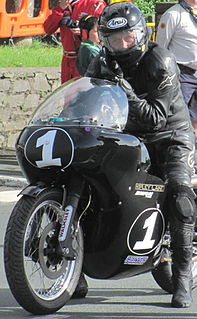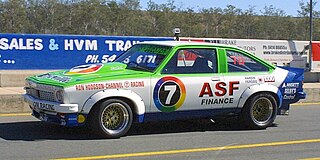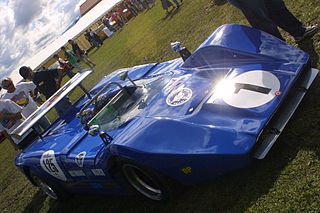The 1965 Six Hour Le Mans was an endurance race open to Sports Cars, Improved Production Touring Cars & Series Production Touring Cars. The event was staged at the Caversham circuit in Western Australia on Monday, 7 June 1965. Results were as follows:
The Six Hour Le Mans was an endurance motor race for sports cars and touring cars held annually in Western Australia from 1955 to 1972. Initially run at the Caversham Airfield circuit, the event was moved, along with all other WA circuit racing, to the then new Wanneroo Park Raceway in 1969.

Western Australia is a state occupying the entire western third of Australia. It is bounded by the Indian Ocean to the north and west, and the Southern Ocean to the south, the Northern Territory to the north-east, and South Australia to the south-east. Western Australia is Australia's largest state, with a total land area of 2,529,875 square kilometres, and the second-largest country subdivision in the world, surpassed only by Russia's Sakha Republic. The state has about 2.6 million inhabitants – around 11 percent of the national total – of whom the vast majority live in the south-west corner, 79 per cent of the population living in the Perth area, leaving the remainder of the state sparsely populated.
| Position | Drivers | No. | Car | Entrant | Laps |
|---|---|---|---|---|---|
| 1 | Spencer Martin David McKay | 1 | Ferrari 250LM | Scuderia Veloce | 223 |
| 2 | Ron Thorp | 2 | AC Cobra 289 | 211 | |
| 3 | Vic Watson Dave Sullivan | 5 | Hurricane V8 | 200 | |
| 4 | Max McCrackan Vin Smith | 7 | Lotus Elite | 200 | |
| 5 | Ted Lisle Mike Tighe | 33 | Morris Cooper S | 193 | |
| 6 | P Capelli Rick Lisle | 36 | Morris Cooper | 188 | |
| Sports Cars 751-1100cc | |||||
| 1 | Gary Griffiths Jeff Dunkerton | 25 | Austin-Healey Sprite | 159 | |
| DNF | Nev McBeth Dick Ward | 26 | Austin-Healey Sprite | ||
| DNF | Don Noack Rod Slater | 24 | Renault 750 | ||
| Sports Cars 1101-1500cc | |||||
| 1 | Max McCrackan Vin Smith | 7 | Lotus Elite | 200 | |
| 2 | Jeff Dunkerton | 4 | Lotus Super 7 | 132 | |
| 3 | Don Baker | 23 | Volkswagen | 122 | |
| DNF | Warren Mathews Lou Orton | 22 | Volkswagen | ||
| DNF | Derek Vince Jack Ayers | 8 | Elfin | 27 | |
| DNF | J Malhoney | 21 | Triumph Spitfire | 27 | |
| Sports Cars 1501-2000cc | |||||
| 1 | J Bavera R Mitchell | 17 | MGB | 189 | |
| 2 | Bob Biltoff T Barlow | 9 | Porsche Super 90 | 166 | |
| 3 | R Britton | 18 | MGA | 121 | |
| Sports Cars 2001-3000cc | |||||
| 1 | Bill Dickson R Fielding | 14 | Holden | 186 | |
| 2 | P Wilkins G Abbott | 12 | Triumph TR4 | 184 | |
| 3 | J Lewis D McKay | 29 | Holden | 130 | |
| DNF | Rod Donovan | 11 | Holden | 82 | |
| DNF | Rod Waller, Lionel Beattie | 6 | Repco Holden Sports | 72 | |
| DNF | John Glasson | 10 | Atlantis | 13 | |
| Sports Cars Over 3000cc | |||||
| 1 | Spencer Martin David McKay | 1 | Ferrari 250LM | Scuderia Veloce | 223 |
| 2 | Ron Thorp | 2 | AC Cobra 289 | 211 | |
| 3 | Vic Watson Dave Sullivan | 5 | Hurricane V8 | 200 | |
| Improved Production Touring Cars 751-1100cc | |||||
| 1 | Ted Lisle Mike Tighe | 33 | Morris Cooper S | 193 | |
| 2 | P Capelli Rick Lisle | 36 | Morris Cooper | 188 | |
| 3 | Stuart Kostera Derek Fletcher | 39 | Ford Anglia | 183 | |
| Improved Production Touring Cars 1101-1500cc | |||||
| 1 | Max Butt G Glatz | 35 | Ford Cortina | 184 | |
| 2 | Ross Urquhart Craig McAllister | 34 | Ford Cortina | 170 | |
| DNF | Owen Stringer M Tighe | 32 | Ford Cortina GT | 152 | |
| DNF | Don O'Sullivan R McDowell | 33 | Ford Cortina GT | 6 | |
| Improved Production Touring Cars 2001-3000cc | |||||
| 1 | J Piesse H Vander Straaten | 37 | Holden | 180 | |
| Improved Production Touring Cars Over 3000cc | |||||
| 1 | Dick Roberts | 30 | Chrysler Valiant | 119 | |
| Series Production Touring Cars 751-1100cc | |||||
| 1 | H De Klerk M Cliff | 42 | Morris Cooper | 176 | |
| DNF | D Black J Brewer | 45 | Vauxhall Viva | 16 | |
| Series Production Touring Cars 1101-1500cc | |||||
| 1 | Leon Shenton T Cuncliffe | 44 | Simca | 166 | |
| Series Production Touring Cars 2000-3000cc | |||||
| 1 | John Hughes D Black | 40 | Holden | 168 | |









